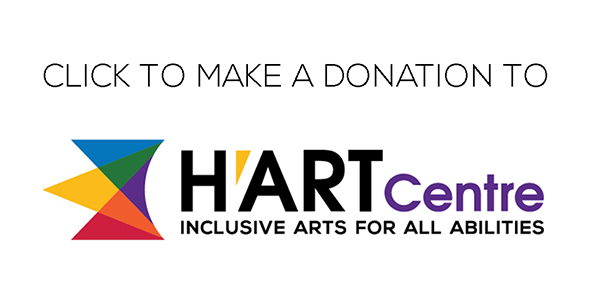Recently, I listened to the 10/3 podcast, “How COVID-19 dropped the curtain on Canada’s arts sector”. Calgary Herald arts reporter Eric Volmers spoke with clarity about the value of the arts sector in Canada and how it has taken a beating during the pandemic. Many of the interviewers’ questions centred on how quickly the sector could reopen. Clearly, Canadians want access to the arts back. And back soon.
The last 16+ months have given everyone a taste of what it is like to be excluded from many activities, including the arts. For some, it has been exclusion from working in the arts. For others, the pandemic interfered with their artistic practice, creation, or study of the arts. Others have missed easy visits to galleries, the theatre, or festivals.
For over 20 years, H’art Centre has been working to improve access to the arts in Kingston. We are a not-for-profit, charitable community arts hub that provides artists with disabilities and those facing barriers with opportunities to create, study and produce works in the arts and collaborate with qualified, trained community artists. We exist because everything was not okay in the sector before the pandemic. Exclusion from the arts for people with disabilities was happening for many reasons including financial inaccessibility, physical space inaccessibility, lack of instructor interest, lack of specialized instructor training, inappropriate class forms, social attitudes, and stigma.
As we work to restart the arts sector, you might wonder how you can help make it stronger than ever.
One step is to educate yourself about arts and disability. We would be happy to connect you to resources, experts, and organizations operating in the disability and art sector across Canada. There are many. I will name only a few here: Tangled Art + Disability, BEING Ottawa, Ottawa’s Propeller Dance, CoolArts, Creative Spirit, and Montreal’s Les Productions des Pieds des Mains.
If you work for a funding organization, review your criteria and look for barriers. Many institutions have made policy changes recently. Check out what The Canada Council for the Arts, The Ontario Arts Council, and the Ontario Trillium Foundation have been doing.
If you are a local artist, arts educator, or member of an arts organization, H’art has a few tools that may help:
You can access our free Inclusivity Guide. Now in pilot testing, our Inclusivity Guide is a one-stop online resource for community arts leaders and event organizers. It will help you consider the accessibility of your next art event and encourage the inclusion of individuals with disabilities.
You can explore our MixAbilities inclusive arts training. Since H’art’s inception, we have provided opportunities for artists, volunteers, placement students, professional artists, and educators to learn more about our approach. MixAbilities is our new six-module training program designed to enhance access to the arts by ensuring artists and educators are trained to effectively and empathetically support participants who are D/deaf and those with disabilities. In June, nine community artists trained in our “MixAbilities”. They also met local artists who facilitate inclusive art workshops. We invited physiotherapist and movement instructor Amy Booth, musician David Archibald, and Deaf theatre professionals Elizabeth Morris and Theresa Upton who shared their own experience and expertise. We look forward to inviting more artists to share their expertise in future, regular training sessions.
More people now understand how it feels to be cut off from meaningful participation in the arts. Let’s create a better sector and a better future together.
Katherine Porter
Executive Director
H’art Centre

